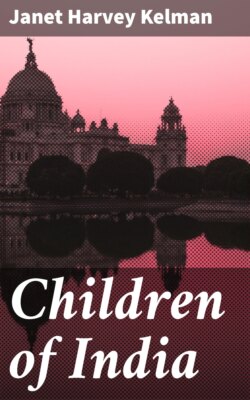Читать книгу Children of India - Janet Harvey Kelman - Страница 7
На сайте Литреса книга снята с продажи.
CHAPTER V
THE STORY OF FATE
ОглавлениеTable of Contents
When a baby is born in India the lines between the bones of its skull can be traced just as they can be traced in a fair-skinned child. The mother of a white baby does not notice them much, but they mean a great deal to an Indian mother, for an ancient story is told about them.
Very long ago a little daughter was born to Brahma, the creator, and its mother asked the father to tell her what would happen to the little child. Then the god Brahma turned his back to his wife and his baby, and stretched out his hand behind him towards the child. In his hand he held a golden pen, and he wrote with it on the baby’s head. He could not see the letters he was writing, but his wife could, and as she read the words she called out to Brahma to change the writing, because she would not have so sad a future for her child. Brahma wrote again, and this time the life he foretold was worse than the first one had been. Again the baby’s mother refused to let him leave so cruel a fate on the head of the child, and once more he wrote. But this time Brahma did not give his wife time to speak. Ere she could say anything he threw away his golden pen, and since that day he has only written once for each child that has been born. The future that Brahma writes on the skull is called the “fate,” and so each Indian mother believes that everything that will happen to her child is fixed when she first traces on the little skull those curious markings which she calls the writing of the pen of Brahma.
When a baby is born there is great eagerness to know whether it is a boy or a girl. If it is a boy there is joy in the home; everyone is glad, and the mother of the little child at once feels that she has been a good woman, and that the gods are pleased with her because they have given her a son. But if the baby is a girl everyone is sad, and the father if he is asked about it may say, “It is nothing,” for he thinks it a sorrow to have a little girl child born. He would far rather have a calf, because a cow is a sacred animal, but the birth of a little girl is a sign of the anger of the gods. Besides that the father knows that he will one day have to pay a great sum to her husband at her marriage. When she is still very young her husband will take her away to his father’s house, so that she will never be able to do anything for her father and mother in their old age. So there are many reasons why a little girl is not welcome. She is a sign of the anger of the gods; she will cost a great deal of money, and she will never be able to help her parents.
Sometimes when a father is told that he has a little daughter, he says nothing, but only clasps his thumb round the fingers of his hand, and that is a sign that the wee baby girl is to die. It is very easy to kill a little infant, and where everyone thinks that it is right, it can be done quietly, so that though those in the house know about it, no one will say anything. It is sad to think how many little children are killed in this way still, even before their mother’s heart has grown tender to them, but some years ago, before the Government of India set itself to stop this crime, there were hundreds of little baby girls killed openly every year.
And if anyone had asked how fathers and mothers could be so cruel the answer would have been, “It is our custom,” or, “It was her fate.” For everything depends on fate to the Hindu, and no one can help anything that happens. If an animal is drowned in a well, he leaves it there. It was the creature’s fate to fall into the well, and it is not his custom to cleanse the well. The children of the village may sicken and die because of the poison in the well, but that too is fate, and no one pauses to ask whether there may not be some other cause.
